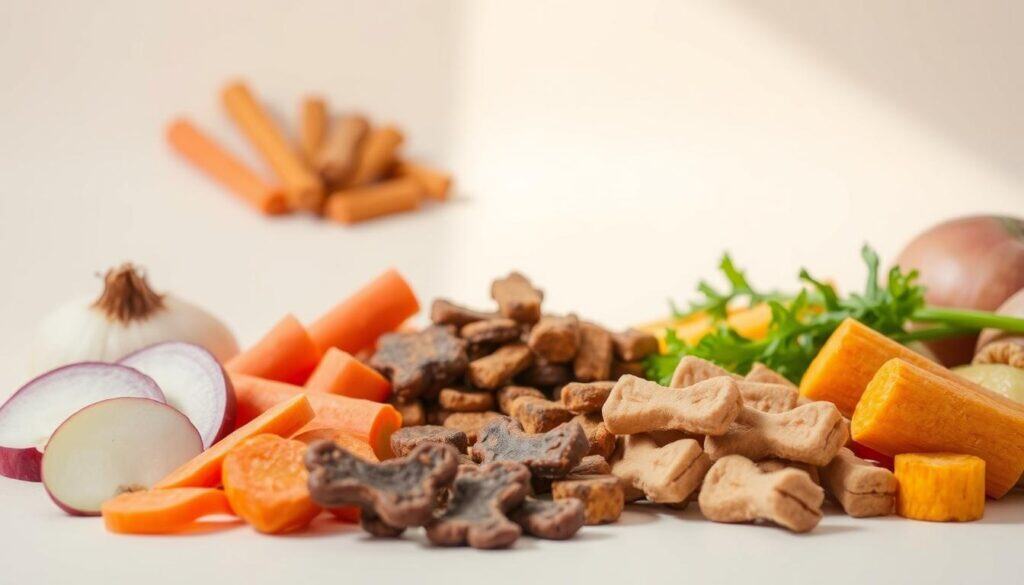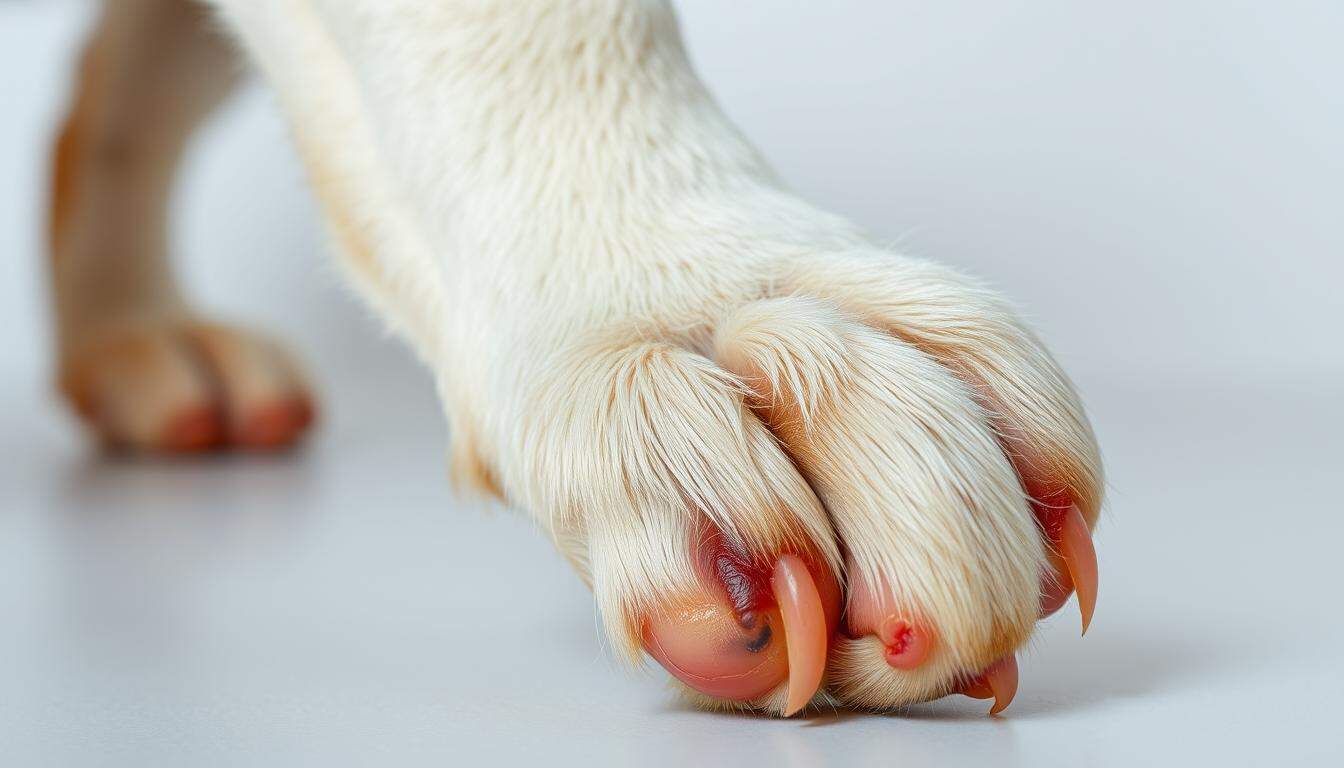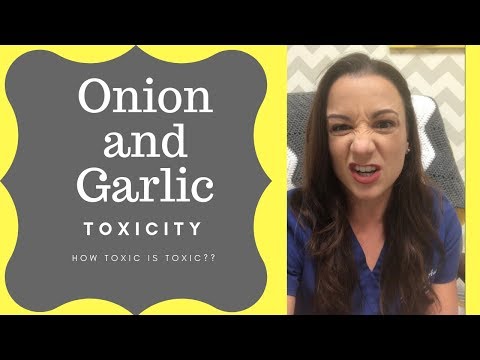Many dog owners worry about the effects of human foods on their pets. This is true for onion toxicity in dogs. Even a little onion can be dangerous for dogs. It’s important for pet owners to know which foods are harmful to their pets.
Onions have compounds that can harm dogs. This makes it key to know what dogs can and can’t eat. Understanding this helps keep our furry friends safe.
Key Takeaways
- Onion toxicity in dogs can occur even with small amounts.
- Understanding the risks of harmful foods for dogs is vital for pet care.
- Not all human foods are safe for canine consumption.
- Prompt action is necessary if a dog consumes onions.
- Familiarity with common symptoms of onion poisoning helps in early detection.
- Every dog may react differently to harmful foods.
Understanding the Risks of Onions for Dogs
Onions are toxic to dogs because of a compound called thiosulfate. This substance can damage red blood cells, leading to anemia. It’s important for pet owners to know this to keep their dogs safe.
Many people don’t know that onions aren’t the only danger. Foods like garlic, leeks, and chives can also harm dogs. Knowing this helps pet owners avoid accidentally feeding their dogs harmful foods.
Will a small amount of onion hurt my dog?
Many pet owners worry about giving their dogs small amounts of onion. It’s important to know about the onion’s chemical makeup. Onions have compounds that can harm dogs, like thiosulfate. Dogs process these differently than humans, which can lead to serious health problems.
Chemical Composition of Onions and Its Effects
Onions contain sulfur compounds, with thiosulfate being key. While safe for humans, it’s dangerous for dogs. It can cause hemolytic anemia, damaging red blood cells and reducing oxygen in the body. Dogs can’t break down thiosulfate well, making them more susceptible to its dangers.
Common Symptoms of Onion Poisoning in Dogs
Pet owners need to know how onions affect dogs. Signs include vomiting, diarrhea, weakness, and tiredness. In severe cases, dogs might have pale gums and breathe fast. Spotting these symptoms early is key to getting the right help for your pet.
What to Do if Your Dog Eats Onion
When your dog eats onion, it’s a stressful moment. Knowing what to do quickly is key. Stay calm and act fast to help your dog.
Immediate Actions for Pet Owners
If your dog eats onion, check how long ago it happened. If it’s been less than two hours, you might need to make them vomit. This can stop more harm.
Also, make sure your dog drinks plenty of water. This helps get rid of toxins. Watch your dog closely for any signs of trouble after they eat onion.
When to Contact Your Veterinarian
If your dog shows signs like being very tired, vomiting, or diarrhea, call the vet. Quick action is important to keep your dog safe. Tell the vet how much onion your dog ate and when.
This helps the vet give the right treatment. Knowing what to do if your dog eats onion helps you care for them in emergencies.

Preventing Onion Toxicity in Dogs
Keeping a dog safe means knowing which foods are okay to share. Onions are dangerous, but there are many safe foods for dogs. These foods can make their diet balanced and fun.
Safe Human Foods for Dogs
Many human foods are great for dogs. Carrots are tasty and full of vitamins. Sweet potatoes are sweet and good for their health. Cooked lean meats like chicken and turkey give them protein.
These foods make dogs happy and keep them healthy. They avoid the dangers of onions.
Tips for Dog-Friendly Meal Preparation
When cooking for dogs, leave out toxic foods. Choose fresh veggies and lean proteins that are safe. Don’t use seasonings or sauces with harmful additives.
By focusing on pet nutrition, you can make meals that are good for them. This way, you avoid dangers like onion toxicity.

Understanding Individual Dog Sensitivities
Dogs can react differently to onions, depending on their breed, age, and health. For example, a young, healthy dog might be okay with a little onion. But an older dog with health problems might not be as lucky.
It’s important for dog owners to watch how their pets react to onions. One dog might get sick from a small amount, while another might not show any signs. This shows how important it is to understand each dog’s health needs.
Alternatives to Onion in Dog Diets
Exploring onion substitutes for dogs is key to a balanced diet. Safe diet alternatives add flavor and nutrients. Herbs like parsley are rich in vitamins and make meals tasty without onion’s risks.
Parsley aids digestion and makes meals exciting. It’s a great choice for dogs.
Vegetables like peas and green beans are also good. They’re safe, full of fiber, and low in calories. These options help keep dogs healthy and meals fun.
Choosing onion substitutes makes mealtime safe and tasty. It lets owners get creative while keeping their dogs healthy. Remembering these alternatives ensures a balanced diet for dogs.




